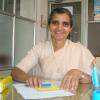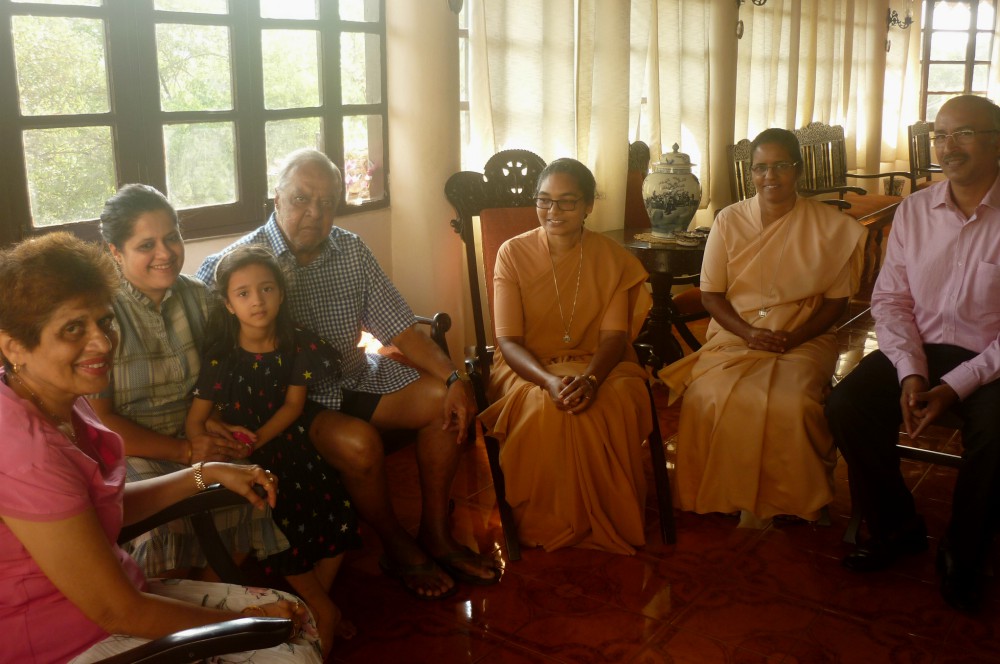
Sr. Jyothi Kerketta and Sr. Celine Sebastian of the Daughters of St. Paul converse with a family in the Fontainhas neighborhood of Panjim India. (Lissy Maruthanakuzhy)
Last September, my community decided to visit the families of our neighborhood of Fontainhas, Panjim, India. We were responding to a call of Pope Francis to visit families, and it was also part of our celebration of Extraordinary Mission Month.
The parish priest, Fr. Walter de Sa, thought it was a good idea, and gave us some suggestions about what such a visit could include.
This would be in addition to our daily commitment to our three Book Centers and other activities. We felt we could devote two to three hours a day to spend with our neighbors. So, we began visiting families in our neighborhood.
Every family welcomed us with delight.
"Sisters, you are in our neighborhood many years. We are familiar [with you]. Only you have not penetrated our lives," a retired school teacher said, looking at me with a smile.
Her open sharing made me think as we were returning home. I recalled another neighbor saying: "We are neighbors for years. But we do not know you, about your mission, your founders or congregation. You all come and go. You pass by our lives never entering, never touching," he had said.
I faced a new reality. Jesus pitched his tent among us, and became one of us. It is not sufficient to pitch my tent among people; I need to connect with them, enter their lives and establish relationships.
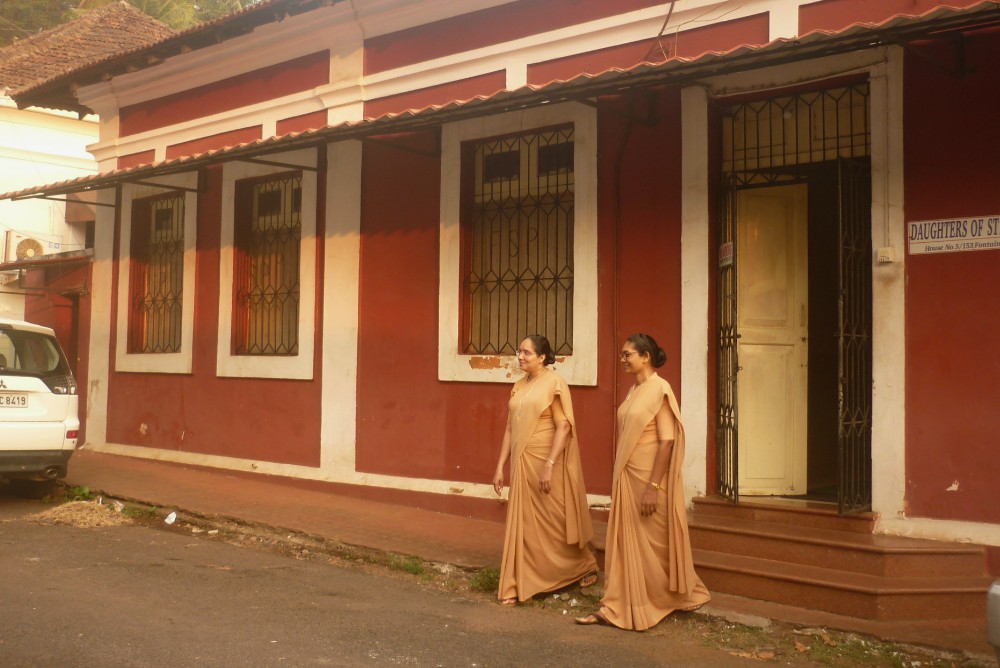
Sr. Rosy Mathew and Sr. Jyothi Kerketta set out on their home visits. (Lissy Maruthanakuzhy)
Our presence for 56 years in the Latin Quarter — Fontainhas (once a Portuguese colony) — had not touched the lives of people!
Why doesn't our yearly celebration of our patron St. Paul bring us closer to our neighbors? Why did we not form an Association of Pauline Cooperators in the neighborhood?
My search took me as usual to the eucharistic Lord. Sitting in silence before him who had revolutionized the world in three years would certainly enlighten me, I believed. The words written above the tabernacle gave me hope: "Do not be afraid, I am with you. From here I want to enlighten."
I am committed to disseminating Jesus' revolutionary Gospel teachings, through the media of social communications, the mission given us by our founder, Blessed James Alberione. Now I realize I am called to do it through my very life and day-to-day interactions.
I realized that after our 56 years in this same parish and neighborhood, we are known only for "providing books and religious articles" through our Pauline Book Centers. I wondered why we had not entered into the lives of our neighbors — really the purpose and meaning of our presence/foundation in this place.
Advertisement
Our local community had been constantly changing. Some sisters would stay for more than 10 years and then return for another 10. Others would be moved after two years or less. This uncertainty made sisters reluctant to put in the time and energy to learn the language. India has more than 22 official languages, so a transfer to a new state meant learning a new language. This is how we justified ourselves for not learning the local language, Konkani.
"It is not similar to my language in any way. All the words are different." We found excuses.
"We are so busy in the Book Center from Monday through Saturday. Where is the time to visit the families in the neighborhood?" we said to each other — justifying our way of living in the midst of people yet away from them.
Beginning our new project, we went to visit homes in teams of two sisters — just in the evenings, since most of neighbors are working people. Two of us would come home from the Book Center an hour early and visit from 5 to 8 p.m., spending about half an hour to an hour with each family, but usually visiting only two or three families in one day.
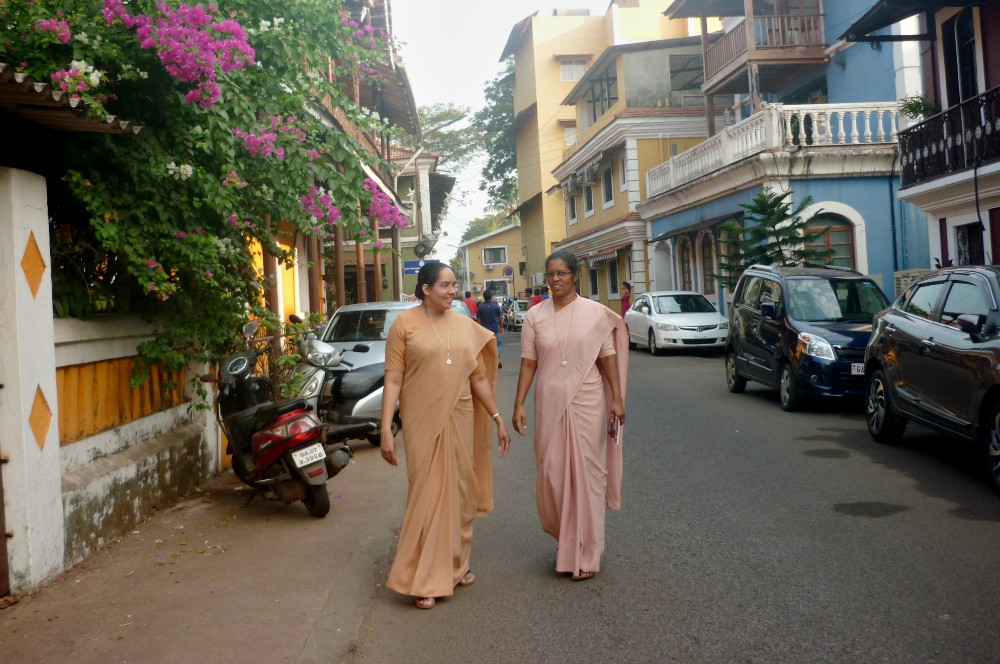
Sr. Rosy Mathew and Sr. Celine Sebastian walk on their way to visiting families. (Lissy Maruthanakuzhy)
We had not announced our visits, but every family welcomed us with much joy, and spent time in conversation with us. It is a Catholic locality, and we felt the home-like feeling of the Panjim neighborhood. Those parents who were alone all day really enjoyed it and asked us to visit often. They loved talking about their children who were away with their families, and showed us their pictures; they were also happy to talk about how they spent their time, displaying their painting and embroidery. We would conclude our visit with a prayer for the concerns of the family.
So far, we have visited 85 families belonging to St. Sebastian's Chapel, which has 192 families. (It is under Immaculate Conception Parish, with 6,500 Catholics.) We want to continue, and Fr. de Sa agreed that we should keep on. He had suggested that we get acquainted with the people in our own area, and then proceed to other areas.
Loneliness is one of the major needs we encounter in the cities.
"Sisters, please come again," neighbors often begged as we took our leave.
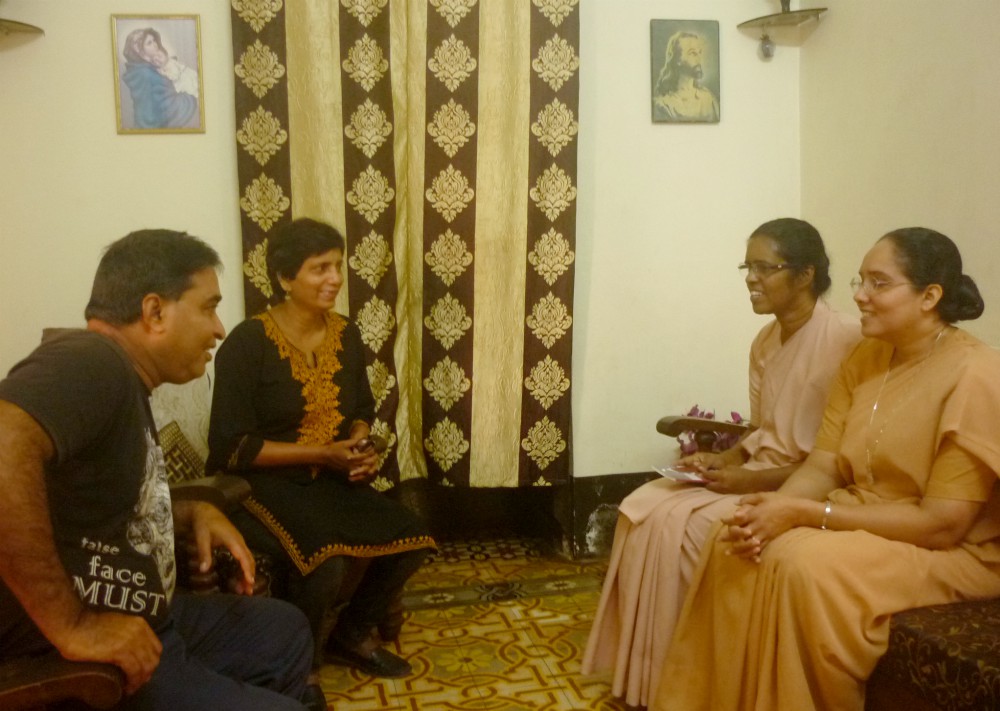
Sr. Rosy Mathew and Sr. Celine Sebastian visit the family of Mr. Coutino. (Lissy Maruthanakuzhy)
Sr. Nancy D'Souza described her experience: "Meeting people in their families was a different understanding for me, an opportunity to get to know them by name, and to know their family situation. It was inspiring to meet the aged and the sick [who were] sometimes alone, yet maintaining a very serene and graceful life, imparting joy to the visitors."
Sr. Celine Sebastian commented that the family visits each day "helped me to forget about myself and become more other-oriented. It was an opportunity for me to get to know our neighbors with all their richness and beauty."
Visiting them during illness and family events is a special way of getting into their lives.
"One memorable experience for me is the family of Sarita. We had met her during our visits and found her sick. We visited her again. Her mother repeated to everyone that sisters had visited them. I felt very close to the family," one of the sisters in the team said.
According to Anita Lima Fernandes, a retired schoolteacher: "Family visiting strengthens our relationships. In these days, we are all so busy that we do not stop even to greet one another after the parish celebration of the Eucharist. My husband, a member of the Parish Pastoral Council, also goes visiting families to keep in touch with our people," she said.
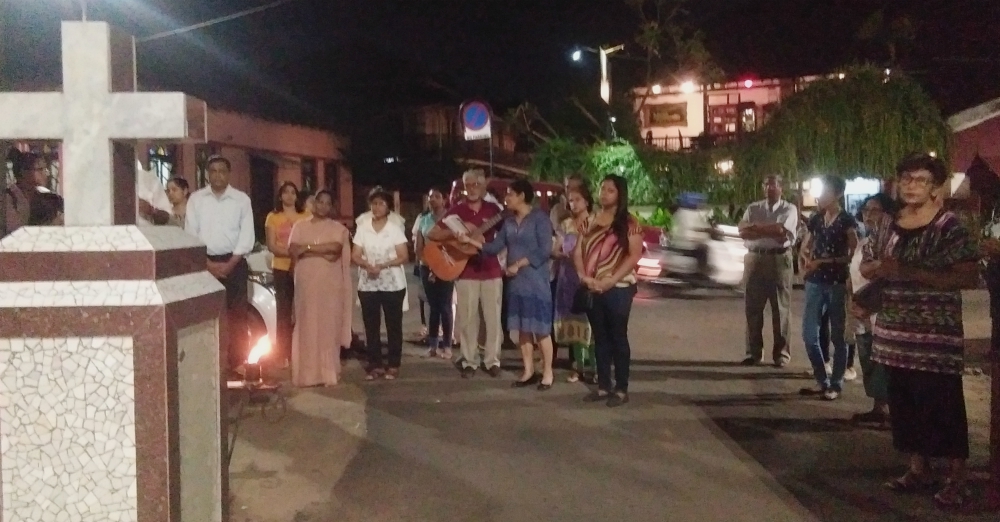
Families in the Fontainhas neighborhood gather around the cross to pray the rosary. (Lissy Maruthanakuzhy)
In Anita's neighborhood, gathering around a cross at the junction of the Fontainhas Heritage area, we pray the rosary every Wednesday. "This practice strengthens our bonding and builds better relationships among the community. We go to church as individuals, when we are called to be communities, as Pope Francis said. After the rosary we chit-chat as we are relaxed in the evening. After Mass, we all run to our own responsibilities so have no time except to say hello," Anita added.
Family visits help us get closer to people around us, and make us aware of the purpose of our existence as a religious in this historic area.
[Lissy Maruthanakuzhy is a member of the worldwide Congregation of the Daughters of St. Paul in India and a correspondent for Matters India, a news portal that focuses on religious and social issues.]
